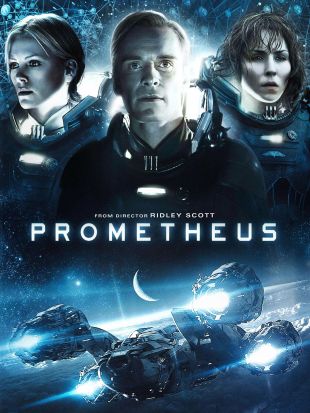
Great science fiction comes from great human drama. By setting a story on a distant planet or galaxies not yet discovered, a writer grants himself the creative freedom to explore existential concepts that might seem far-fetched with his feet on the ground; in space, the possibilities of answers to our most pressing questions are only limited by the storyteller's imagination. As frustratingly complex and thematically cumbersome as its predecessor was simple and elegant, Ridley Scott's Prometheus charges ahead with an ambitious sci-fi plot exploring the roots of the human race, but stumbles due to a screenplay that refuses to address the many compelling ideas it raises early on. There are plenty of heady concepts to be found in the script by Jon Spaihts and Damon Lindelof, but the trouble is that once they've been posed, the story begins to favor simple -- albeit somewhat effective -- sci-fi spectacle over true existential terror, resulting in a disjointed, unsatisfying experience.
Isle of Skye, Scotland: 2089. Archaeologists Elizabeth Shaw (Noomi Rapace) and Charlie Holloway (Logan Marshall-Green) discover a cave drawing featuring a mysterious star pattern not found in our solar system. Upon comparing the image with similar ones found at different archeological digs all over the planet, the pair realize that they all match perfectly. They're convinced that the image is an invitation, and set out on a high-tech Weyland Industries spaceship called Prometheus to -- just maybe -- unlock the mysteries of mankind's origins on Earth. Flash forward to Christmas Day, 2093. The crew of Prometheus awaken from stasis to learn they have arrived at their destination. With highly intelligent android David (Michael Fassbender) assisting the mission and chilly Weyland representative Meredith Vickers (Charlize Theron) calling the shots, Captain Janek (Idris Elba) brings the ship down to the surface, landing next to a line of awe-inspiring structures that appear to have been built by intelligent beings. But when a small crew led by Elizabeth and Charlie explore the remote planet, the artifacts they find threaten to contradict everything mankind had been taught about its origins. And there's a secret in a chamber they come across that's lain dormant for centuries, and now that it senses life, it finally sees an opportunity to escape. If it does, the trip that was supposed to answer all of our biggest questions about life could also be the one that seals the fate of every living creature on planet Earth.

The first 30 minutes of Prometheus might just be some of the most exciting science fiction of the past few decades. With an enigmatic preface to set up the story, top-shelf production values, and thought-provoking concepts wrapped up in a tale that successfully conveys the spirit of exploration, it's easy to get lost in the action. Shortly after the crew touch down on the alien planet and set out on their mission, however, the cracks in Lindelof and Spaihts' screenplay begin to show: Characters begin acting in ways that conveniently serve the story rather than reflecting their true nature, and tense sci-fi set pieces begin to overshadow the film's ambitious ideas. Some of it makes a fair amount of sense when you keep in mind that Prometheus was initially conceived as an Alien prequel, but once it becomes apparent that the screenwriters have little interest in offering answers to their questions, frustrated Lost fans may start having some disturbing flashbacks (Lindelof was one of the show's creators). While it's true that the most effective sci-fi films (Alien included) allow viewers to use their imagination to a certain extent, should the gaps in the storytelling become too wide, the screenwriters risk allowing the audience to fall right into the void with no hope of finding their way out. That's essentially what happens with Prometheus as the wonder of space exploration gives way to the horror of the unknown, leaving the viewer to marvel at the mastery of the filmmaking while completely disengaging intellectually.
Truth be told, the Alien franchise needed a breath of fresh air at this point; after two undisputed classics and two noble attempts by respected visionary filmmakers, the familiar formula was going stale. Like Jason in the Friday the 13th series or Leatherface in Texas Chainsaw Massacre, we can only watch the xenomorphs stalk their prey amongst the stars so many times before we start to experience déjà vu (the less said about the two Alien vs. Predator films, the better). For a while, it appears as if Scott and company have managed the impossible by constructing a new mythology on the foundation of an old one. But the longer questions go unanswered, the more frustration begins to set in, until it becomes obvious that the writers (a) never had any real intentions of following through with their ideas in the first place or (b) never sought anything more than to plant the seeds of a new franchise. Either way, it's an insult to the fans who have dreamt of the possibilities for decades. They truly deserved something more.

That said, Prometheus is positively gorgeous to behold -- a breathtaking blend of richly textured cinematography and awe-inspiring set design -- and it always maintains momentum, even while falling apart on the page. Quiet scenes, like that of David casually killing time while the crew is in stasis, possess a pacing that pulls us in and keep us engaged even when it's all going wrong. And after those first signs of danger begin to emerge, we're still treated to a few set pieces that genuinely get the heart racing. If only the screenwriters engaged our intellect like the filmmaker engages our fears, we would have had a new classic, rather than a beautiful, unfulfilled promise.
